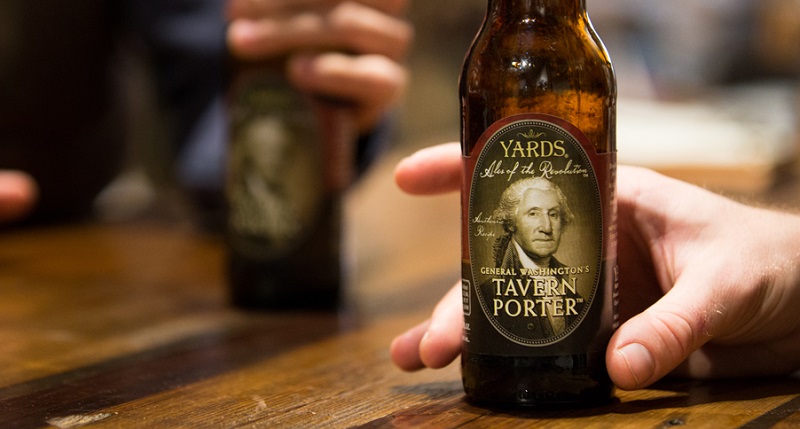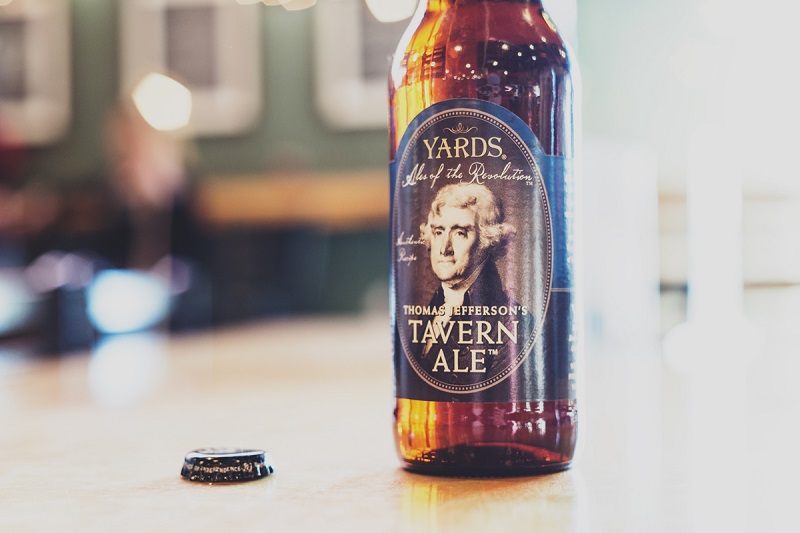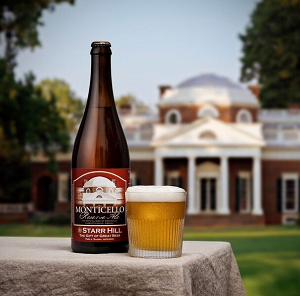Recreating Presidential Beers
Thomas Jefferson was known for a predilection towards French cuisine, but beer and cider, not wine, took center stage at the president’s dinner table.
Jefferson was just one of many leaders from George Washington to Franklin Delano Roosevelt and Barack Obama with a pronounced love for beer. Whether it be from the presidents’ own brewing endeavors, the White House itself or established breweries, the beverage is almost as presidential as the holiday. But the beers consumed by our founding fathers were far different from today’s varieties.
That’s not to say, however, that those early presidential tipples have completely disappeared.
In 1999 the City Tavern in Philadelphia approached local Yards Brewing Co. to bring bygone beers from our early presidents into the now as part of the historic restaurant’s restoration. The tavern wanted to ensure that all items on its menu held true to the colonial era.
Yards got ahold of some of the founding fathers’ original recipes using the Tavern’s help, and the brewery’s “Ales of the Revolution” series, which is still sold on draft at the City Tavern today, was born.
“We were really convinced that we were doing something that was truly real because we were using the same materials,” said Tom Kehoe, the founder and president of Yards.
The company even went to the lengths of using bricked-in kettles and direct flame when brewing its Ales of the Revolution, a more instinctual than industrial method that looks more fitting in a colonial museum than a modern brewhouse.

(Photo courtesy Yards Brewing Co.)
Tavern Porter, inspired by George Washington, was derived from one of Washington’s letters during the Revolutionary War. Since rations were scarce, Washington wrote to officers about a method to extend their ration of ale by adding bran oats, water and molasses to a half-empty cask, then letting the mixture re-ferment from the leftover beer’s yeast.
“It was part beer, part a molasses-bran-oat wine,” said Kehoe.
The brewery tried keeping true to this recipe at first, but eventually phased out the oat flakes and shifted the molasses to secondary fermentation in order to make a more consistent, drinkable product rather than an extended ration.
Tavern Ale, a beer inspired by Jefferson’s homebrewing at Monticello, is Yards’ best selling colonial product.
“In some markets, it’s our second-best selling beer,” said Kehoe. “There are some places that go on the TJ kick.”

(Photo courtesy Yards Brewing Co.)
Jefferson was known for being a gourmet—he owned a home in Paris and had a keen interest in French gastronomy. He even had his chefs accompany him overseas to learn the French style of cooking from local chefs. Furthermore, Jefferson was known for practicing agriculture at his still-standing estate of Monticello. And that is what laid the foundation for his brewing career.
According to Robbie O’Cain, brewmaster of Starr Hill Brewery in Crozet, Virginia, Jefferson was more of an artist than an industrialist when it came to beer. The former president didn’t keep recipes, but he did own many books on beer. And he vigorously studied the art of brewing. In fact, Jefferson interned a British brewer, Captain Joseph Miller, after the War of 1812 to get his brewing operations into tip-top shape.
“I am lately become a brewer for family use, having had the benefit of instruction to one of my people by an English brewer of the first order,” Jefferson wrote in an 1815 letter to describe Miller’s effect on his brewing prowess.
Starr Hill, which is located about 30 miles from Jefferson’s Monticello estate, also makes a beer based on Jefferson’s lingering notes on brewing. Dubbed Monticello Reserve Ale, the beer is actually the official beer of the historical site. In 2011 it took home the silver medal for “Indigenous Beer” at the Great American Beer Festival.

(Graphic courtesy Starr Hill Brewery and Monticello)
According to O’Cain, Jefferson brewed using only ingredients available at Monticello. They included an unnamed variety of hops, wheat and corn, but no barley. This is why Starr Hill’s Monticello Reserve Ale has a distinctive grain profile.
“We don’t use corn in any other beer, but a lot of folks used corn back when barley was scarce,” O’Cain said.
Yards’ Tavern Ale is similar to Starr Hill’s recipe, though it does use barley and rye in its grain profile, and adds honey “for more of an alcohol kick,” said Kehoe.
According to O’Cain, the grain profile of Starr Hill’s top-fermenting, unfiltered ale provides a creaminess to the beer and a “strong corn characteristic.”
Moving forward, O’Cain wants to take Monticello Reserve even further into the past.
“I really think the next step for this beer not that we have the capabilities is to take it into the sour-slash-wild area,” said O’Cain.
Yeast and fermentation weren’t really controlled or understood during Jefferson’s time, and so, as O’Cain says, the original beer of Monticello would likely have been “kind of like a Virginia wild ale” brewed from resident microflora.
To revert back to that pre-technological type of brewing, O’Cain says, would be “getting back to the core of it all.”
Bo McMillan is a writer and self-professed nerd based out of Chapel Hill, North Carolina, whose interests include food history, coffee, contemporary literature and cooking. He did not try to brew using any of the literature from this story, mostly because of the direct flame, and for the sake of his house.

I really enjoyed this story–it’s great to have the contributions of Jefferson and Washington in the spotlight. Since it’s Black History Month as well as Presidents’ Day, I’d like to point out a couple of things relevant to the times. The story says Jefferson had his “chefs” accompany him to France. Actually, it was one of the enslaved workers James Hemings, brother of Sally Hemings, who went to Paris specifically to learn French cuisine (there’s speculation that one of the dishes Hemings and Jefferson brought back to America was Macaroni and Cheese). Also, another enslaved worker, Peter Hemings (another brother of Sally’s), was the one trained by Capt. Joseph Miller as a brewer, and Jefferson noted Hemings’ intelligence and skill in his letters. Interestingly, James Hemings gained his freedom by teaching his brother Peter in the nuances of French cuisine. Again, I thoroughly enjoyed this story.
I drank a number of the Yards Presidents beer. When my wife and I volunteered at the Gettysburg National Park and Battlefield forthe NPS. All of them were really tasty. To bad I cannot find them back here in North Carolina.
You’ve missed Poor Richard’s Spruce Ale by Yards. Delicious!